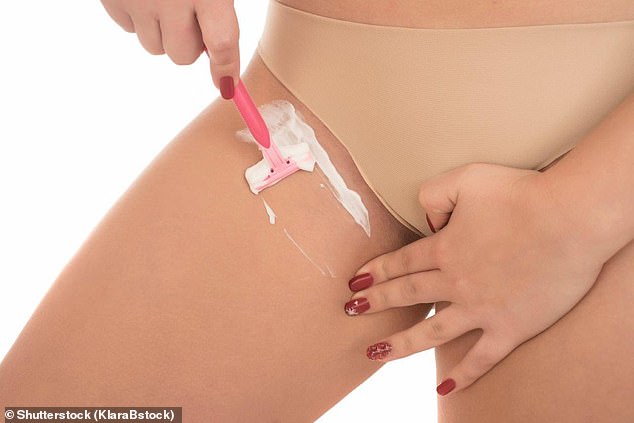Getting ready for oral sex or ‘liking feeling soft’ are people’s top reasons for shaving or waxing their pubic hair.
A study of more than 4,000 men and women delved into reasons behind people’s intimate grooming rituals, revealing 60 per cent remove all or part of their hair.
Women, of whom eight out of 10 admitted to be hair-removers, also said they did it to feel more feminine or because their sexual partner preferred it.
Men were significantly less likely to be keen groomers but almost four in 10 of those who did it admitted they believed it was more hygienic.
The scientists behind the study said removing pubic hair is becoming more common and is associated with specific injuries which doctors need to better understand
Researchers from Katholieke Universiteit Leuven (KU Leuven) in Flanders, Belgium, surveyed a total of 4,422 Belgian people over the age of 15.
They asked whether people groomed themselves, why they did it (but not how) and what their relationship status and sexuality were.
Men were far less likely to do so, with 39 per cent of them admitting to it.
Even women in the groups with the lowest levels of preening were more likely to do it than the best-groomed men.
Perhaps surprisingly, men over the age of 60 were considerably more likely to tame their pubic hair than the under-30s, although the opposite was true for women.
Young women between the ages of 15 and 20 were found to be the age group most likely to remove their pubic hair, with 87.8 per cent of them doing it.
But fewer than a third of men in the same age group did so.
Males were more likely to trim when they were in their 40s – the only age group with more than half of men admitting to doing it.
The scientists also found lesbian women were the best-groomed group.
Among men, bisexuals were most likely to be hairless, along with those who were married. But women were most likely to groom if dating someone they didn’t live with.
The top three reasons people picked for removing their pubic hair were also revealed in the study.
Comfort during oral sex topped the list for both, with 39.3 per cent of men and 74.9 per cent of women choosing this reason.
Exactly two thirds of women said they did it because they ‘feel more feminine when I remove my pubic hair’.
Some 63.2 per cent of women said ‘I like to feel soft’ and 62.2 per cent of them said ‘my partner wants it’.
Cleanliness was a close second for men’s top reason, with 39 per cent of them saying they ‘think it is more hygienic’.
More than a third of men (36.6 per cent) admitted they ‘like to feel soft’ and 35.6 per cent said their partner wanted them to be clean shaven.
The researchers said increasing numbers of people removing their pubic hair was leading to more injuries and infections, which doctors needed to understand.
Led by Dr Paul Enzlin, the team wrote: ‘Various cultural, artistic and historical accounts have shown that in several cultures, pubic hair removal (PHR) remains a widespread practice, especially among women.
‘In Western cultures, the prevalence of PHR is increasing, a trend accompanied by an increasing incidence of PHR injuries.
‘Indeed, complications related to PHR are common and PHR may even be a risk factor for the transmission of minor sexually transmitted infections.
‘Although this implies that PHR is relevant for sexual medicine practitioners, there remains a lack of information on its prevalence and associated factors, information that could be helpful for educating men and women about PHR in an attempt to prevent sexual health-related issues.’


Comments are closed.